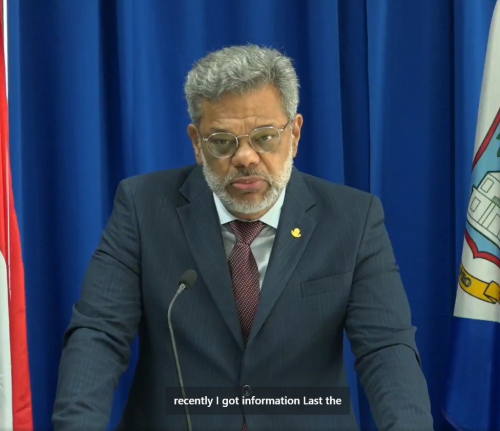 PHILIPSBURG:--- Prime Minister Dr. Luc Mercelina delivered a powerful address marking nearly 15 years of constitutional autonomy, calling for a fundamental overhaul of Sint Maarten's relationship with the Netherlands and its Caribbean sister islands. Arguing that the current structure is an "expensive and inflated" illusion, the Prime Minister outlined a bold new vision for the nation's future, urging a move away from historical constructs and toward direct, individual partnerships.
PHILIPSBURG:--- Prime Minister Dr. Luc Mercelina delivered a powerful address marking nearly 15 years of constitutional autonomy, calling for a fundamental overhaul of Sint Maarten's relationship with the Netherlands and its Caribbean sister islands. Arguing that the current structure is an "expensive and inflated" illusion, the Prime Minister outlined a bold new vision for the nation's future, urging a move away from historical constructs and toward direct, individual partnerships.
In his speech, titled "Sint Maarten: 15 Years of Constitutional Autonomy – Lessons, Prospects, Achievements," Dr. Mercelina asserted that Sint Maarten's survival is better secured as an autonomous constituent state, but only if the Kingdom of the Netherlands is redefined entirely.
"The real question we must ask ourselves today is not what the past fifteen years have done to Sint Maarten, but rather, how has our long and complex history shaped these past fifteen years of autonomy?" Dr. Mercelina began, framing the island's journey within a 170-year context.
A Call to Dismantle Old Structures
A central theme of the address was the need to abandon outdated frameworks. The Prime Minister called for an end to the "CAS construction" (referring to Curaçao, Aruba, and Sint Maarten) and the "Country Consultation" (vier-Landen Overleg), arguing these concepts are relics of the dissolved Netherlands Antilles.
"The term 'Netherlands Antilles' is gone, yet we have reintroduced the same concept under the name CAS. For me, CAS is wishful thinking," he stated. "It is time for Sint Maarten to define its own relationship with the Netherlands — just as Aruba and Curaçao must define theirs."
He proposed replacing these multi-island forums with direct, bilateral relationships between each Caribbean country and the Netherlands. This, he argued, would decolonize communication lines, which he described as "at least six controlling and ineffective communication layers" that weaken dialogue. "My dialogue partner as Prime Minister should be the Prime Minister of the Netherlands and not the State Secretary," he declared.
Prospects for a Redefined Kingdom
Dr. Mercelina laid out a thirteen-point plan for the nation's future, focusing on co-ownership, equality, and practical nation-building. Key proposals include:
- Shared Responsibility: Defense, healthcare, and education should be shared responsibilities within the Kingdom, but not based on the principle of "who pays determines."
- Political Dialogue Platform: The establishment of a permanent Kingdom Political Dialogue Platform where all four countries can meet as equal partners.
- Democratic Deficit: A call to find "radical solutions" for the democratic deficit within the Kingdom Council of Ministers to ensure fair and effective representation.
- Economic Stability: Prioritizing a balanced national budget and exploring dollarization, following the model of Saba, Statia, and Bonaire.
- Strengthening National Pillars: Fortifying the six essential pillars for a constituent state: the airport, harbor, telecommunications, utilities, the hospital, and a sustainable budget, which he currently assesses as not "strong and stable enough."
Lessons from the Past 15 Years
Reflecting on the period since Sint Maarten gained country status on October 10, 2010, the Prime Minister identified several critical lessons. He noted that the country became "hypnotized by the idea of independence," focusing on proving its self-sufficiency to the Netherlands while neglecting to build alliances with other Caribbean nations outside the Kingdom.
He also criticized the island's institutional structure as a "hydrocephalus" — an oversized head for a small community of 60,000 people. He listed the Council of Advice, General Audit Chamber, Ombudsman, and other bodies as contributing to a financially burdensome system.
Despite the challenges, Dr. Mercelina celebrated the nation's achievements, including the establishment of these very institutions as a sign of democratic maturity and a commitment to good governance. He also pointed to infrastructure developments like the airport, harbor, and the new hospital currently under construction.
"We have inherited a history that has not always been ours to choose, but the future is ours to claim," he concluded. "May God bless Sint Maarten in the great work of nation-building."